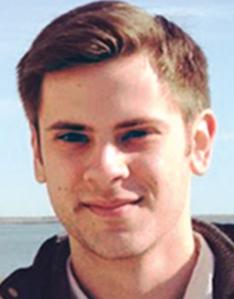There was an intellectual edge to the Reunions performance called Newbies, by Princeton’s newest improv group — the first made up of grad students. The sketches weren’t typical comedic fare: Freud. Post-racialism. Union organizing. Feudalism.
After receiving topics from the audience at Rocky-Mathey Theater, Alexander Geller, a Ph.D. student in molecular biology, teed off a prompt about “The Trivial Pursuits of Man” with an angst-filled comic monologue. “I don’t know why I keep thinking about gene frequencies,” he said. “Really, I think everything’s trivial. I’m like, ‘Why would I ever want to work when eventually I’m just going to become subatomic particles?’”
Later, Geller played a disrespected osteopathic physician. “I’m more of a doctor than a Ph.D. is, right?” he protested, to knowing laughter. “I’m not just, like, genociding rats all day!” (Animals are a favorite grad-student topic.)
Improv has been a popular Reunions offering for years — and never more popular than this year. In addition to watching the Newbies show by the Graduate Improv Club and shows by mainstays Quipfire! and Fuzzy Dice, Princeton’s oldest undergraduate teams, Reuners were able to dip a toe into improv themselves, with instruction by members of the 4-year-old Lobster Club group.
Reunions may be Princeton’s most relaxed event, but the Newbies show has its roots in ... the opposite of that. Lili Cai, a first-year Ph.D. student in neuroscience, pitched the idea of a team to deans at the Graduate School as an outlet for grad-student stress. “I think all of us are extremely anxious [and] weird — we need a release,” Cai explained. “Like if you have a meeting with your adviser that doesn’t go well, you can replay it as improv.” The pitch worked; the school provided financial support.
Plus, Cai suggested, improv can help scholars become better academic communicators. “Grad school attracts more introverted people, so I think improv helps us,” she said.
“With improv, as long as you do whatever you do with aplomb, you’ll be fine,” said Geller, the molecular biology student. “The audience is like a German shepherd. They can only sense fear.”
Unlike Quipfire! and Fuzzy Dice, Princeton’s two new groups offer open classes and performances, not selective auditions. The Lobsters now have 30 regular members and perform throughout the year. “We treat everyone as if we’re all level one,” the group’s artistic director, Daniel Spruill ’18, said of the troupe’s open approach. Sure enough, on the Friday of Reunions the group held an alumni workshop as part of its mission of “improv for all.”
Spruill started with the basics. “The heart of a good improv scene is CROP: Character, Relationships, Objects, and Place,” he said. He then split the group into two lines for an exercise in character-building. A performer in one line would shout out an identity; his partner would then respond by naming a complementary role.
“I’m a firefighter!” an alum began.
“I’m a cat stuck in a tree!” came the response.
“I’m a hipster!”
“I’m the singer of your favorite band!”
“I’m a Princeton student!”
“I’m the dean of the college!”
“I’m a Harvard student!”
“I’m a disappointed parent!”
“Very good, very good!” Spruill said, laughing.



